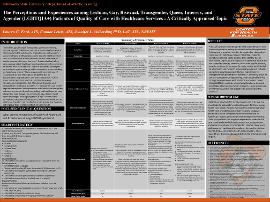| dc.contributor.author | Ford, Lauren G. | |
| dc.contributor.author | Lewis, Connor | |
| dc.contributor.author | Volberding, Jennifer L. | |
| dc.date.accessioned | 2023-11-02T20:44:16Z | |
| dc.date.available | 2023-11-02T20:44:16Z | |
| dc.date.issued | 2023-02-17 | |
| dc.identifier | ouhd_Ford_perceptionsandexperiencesamong_2023 | |
| dc.identifier.citation | Ford, L. G., Lewis, C., and Volberding, J. L. (2023, February 17). The Perceptions and experiences among lesbian, gay, bisexual, transgender, queer, intersex, and agender (LGBTQIA+) patients of quality of care with healthcare services. Poster presented at Research Week, Oklahoma State University Center for Health Sciences, Tulsa, Ok. | |
| dc.identifier.uri | https://hdl.handle.net/11244/339890 | |
| dc.description.abstract | Clinical Scenario: The LGBTQIA+ community has a unique set of healthcare needs and experience barriers to services. Many providers assume these needs are similar to heterosexual counterparts. Investigating experiences and perceptions with healthcare and recommendations on how to improve care can provide insight for professionals. | |
| dc.description.abstract | Clinical Question: What are the perceptions of quality of healthcare and experiences among the LGBTQIA+ patients? | |
| dc.description.abstract | Summary of Key Findings: A search was performed for articles exploring perceptions and experiences of LGBTQIA+ patients with healthcare. Four articles were included. All were Level VI qualitative studies. All demonstrated a lack of cultural competency leading to poor experiences with providers. Common themes included: misgendering, stigmatization, and negative provider attitude leading to poor experiences. Experiences improved if providers used inclusive language, created welcoming environments, and had knowledge/experience about needs of LGBTQIA+ patients. | |
| dc.description.abstract | Clinical Bottom Line: LGBTQIA+ patients felt providers lacked adequate knowledge to understand and care for their needs. Future research should include facts contributing to accessing healthcare services, solutions to these barriers, and increasing geographic areas. | |
| dc.description.abstract | Strength of Recommendation: According to the SORT scale, there is Level A evidence that LGBTQIA+ patients experience providers who are not adequately prepared to properly care for their unique needs. | |
| dc.format | application/pdf | |
| dc.language | en_US | |
| dc.publisher | Oklahoma State University Center for Health Sciences | |
| dc.rights | The author(s) retain the copyright or have the right to deposit the item giving the Oklahoma State University Library a limited, non-exclusive right to share this material in its institutional repository. Contact Digital Resources and Discovery Services at lib-dls@okstate.edu or 405-744-9161 for the permission policy on the use, reproduction or distribution of this material. | |
| dc.title | Perceptions and experiences among lesbian, gay, bisexual, transgender, queer, intersex, and agender (LGBTQIA+) patients of quality of care with healthcare services | |
| osu.filename | ouhd_Ford_perceptionsandexperiencesamong_2023.pdf | |
| dc.type.genre | Presentation | |
| dc.type.material | Text | |
| dc.subject.keywords | LGBTQIA+ | |
| dc.subject.keywords | perceptions | |
| dc.subject.keywords | experiences | |
| dc.subject.keywords | healthcare | |
| dc.subject.keywords | discrimination | |
